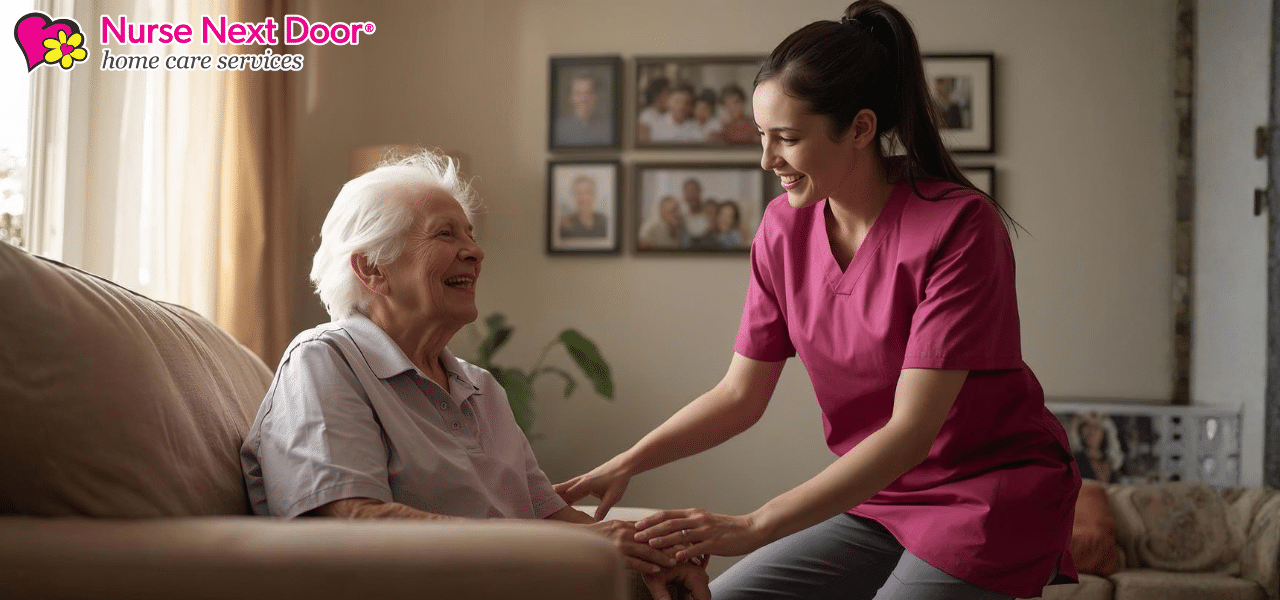
Around 7 million Americans, including many seniors in Fairfax, VA, have Alzheimer’s disease. Due to this condition, they and their families often face various challenges. Alzheimer’s patient care at home is an effective way to maintain their quality of life. Besides providing support and comfort to the Alzheimer’s patient, it also eases the burden of the caregiver. This article covers some expert tips and how Nurse Next Door McLean can help clients navigate Alzheimer’s home care in Fairfax.
Top In-Home Care in Fairfax, VA: Effective Services for Seniors
Understanding Alzheimer’s Disease
Alzheimer’s disease is a serious disorder of the brain that affects the person’s memory, thinking, and daily activities. The condition often begins with mild memory loss and progresses to severe cognitive decline. Common symptoms include confusion, difficulty completing daily tasks, personality changes, and poor judgment. Diagnosing the disorder early is important as it allows you to plan properly and provide timely treatments and care.
Family members who take up caregiving responsibilities often face emotional, physical, and financial challenges. This is where at-home Alzheimer’s care services prove valuable, as they offer comprehensive and personalised 24/7 support at home to the client and the family.
Expert Tips for Managing Alzheimer’s Home Care in Fairfax
Creating a Safe Home Environment
Conducting a home safety assessment is essential for senior Alzheimer’s care. With this approach, we can identify factors that can increase fall and injury rates and can lead to hospitalization. Simple home modifications can significantly reduce accident risks. Installing grab bars for support, removing items such as loose rugs that can lead to tripping, and ensuring adequate lighting are effective strategies.
Since falls and wandering are common among dementia and Alzheimer’s patients, measures like using secure locks, door alarms, and clear pathways can mitigate these risks. Assistive tech items like GPS trackers and monitoring tech further support the safety of Alzheimer’s patients.
Establishing Daily Routines and Activities
Organized daily routines provide stability to Alzheimer’s patients, reduce anxiety, and bring more independence. Familiar activities such as cooking and gardening offer comfort and a sense of control to the patient. Engaging in cognitive tasks, such as puzzles, and physical exercises like walking, can also help slow cognitive decline.
It is important to align the activities with the person’s abilities and interests. For example, using music with a steady beat during mobility activities promotes natural timing and movement patterns.
Effective Communication Strategies
Using clear communication techniques, like speaking slowly, using simple words, and maintaining eye contact, is crucial for senior Alzheimer’s care. Understanding the triggers and providing reassurance can help manage behavioral changes. Similarly, non-verbal cues, such as gentle touch and facial expressions, can convey empathy. Validation therapy acknowledges the patient’s feelings without correction. This approach helps in building trust and reducing agitation.
Managing Health and Medical Needs
Alzheimer’s patient care varies based on the three stages of this condition (early, middle, and late) as each stage requires tailored support. Early stages may need minimal adjustments in daily routine, while later stages of care involve extensive care solutions. It is also important to manage the medications and their frequent side effects, like dizziness and confusion. As undernutrition is common among Alzheimer’s and dementia patients, the nutritional needs should be addressed based on physical health.
The 7 Stages of Dementia Chart
Self-Care for Caregivers
Family caregivers often face high stress levels and anxiety, which leads to burnout. Respite care ensures continued support to the Alzheimer’s patient while allowing family caregivers to rest. Nurse Next Door McLean provides dependable respite care services, ranging from a few hours to months.
Cognitive Support
Engaging in memory care activities, such as word games and puzzles, can help slow cognitive decline. Music therapy, storytelling, and reminiscing sessions also improve engagement and mood. These activities may help preserve cognitive skills and improve quality of life.
Nurse Next Door McLean’s Alzheimer’s Home Care Services in Fairfax
Nurse Next Door McLean offers compassionate, personalized Alzheimer’s home care in Fairfax. Our services include tailored care plans that focus on supporting clients’ independence and well-being. Trained, licensed, and experienced caregivers assist with daily activities, provide cognitive support, manage medication, and ensure safety within the comfort of the home. Here’s why you should consider choosing Nurse Next Door McLean for reliable senior Alzheimer’s care:
- We establish daily routines to reduce confusion and anxiety.
- Professionally trained staff is available 24/7.
- We facilitate communication and use various strategies to manage difficult behaviors.
- With respite care services, family caregivers can find peace of mind.
- We keep your loved one’s mind sharp through cognitive support.
- The in-home Alzheimer’s care plan includes measures to minimize the risk of falls and wandering away.
- Assistance with activities of daily living (ADLs).
- Our licensed caregivers provide continuous health monitoring and support.
These services lead to a better quality of life for both clients and their families.
Conclusion
Effective Alzheimer’s home care involves consistent routines, safety measures, personal care, medication management, and cognitive and emotional support. Compassionate and personalised caregiving can help you manage various challenges associated with the disease. Explore Nurse Next Door McLean’s services today to improve your loved one’s quality of life.



